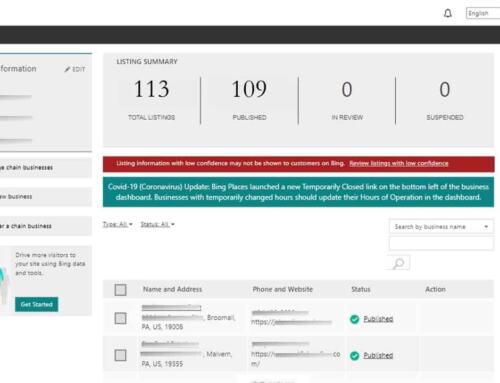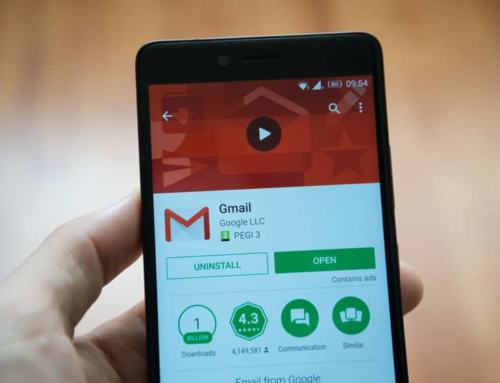Estimated Read Time: 5 Minutes
Why Local SEO Is Important
Local search results are highly visible on the web. A small business with a limited budget may not want, or need, to compete with national or international companies to appear at or near the top of search engine results. Local SEO might be all you need if the consumers you’re trying to gain visibility with:
- search from a neighboring location; or
- use your (or a close by) location name as one of their search terms.
Google displays local and organic search results together on the same page. You don’t have to click separately on the “maps” engine tab to view the most prominent local search results. These “blended results” display when you include a location in your search query (for example, “Philadelphia Pizza”). In some instances (when a match is available), you don’t even have to include a geographic keyword. Google will “assume” your location-based on the physical network (IP) address of your search device and show local results anyway.
Local search has strong commercial value.
- 35% of all searches are for local content. (DM News /Comscore)
- 54% of Americans have substituted the internet and local search for phone books. (ComScore networks)
- 61% of smart phone users conduct local searches. (Localeze /15miles)
- 80% of budgets are spent within 50 miles of the home. (DMA / proprietary)
- 82% of local searchers follow-up offline via an in-store visit, phone call or purchase. (TMP / ComScore)
The number of local searches is on an upward trend given the growing prevalence of tablets and Internet connections. In October, 2012 Pew Research reported that 22 percent of adults in the US own tablets and half have mobile Internet.
So what’s the key to local SEO success? If you had to focus on just one thing, what should it be?
Focus on the Data
SEO is, in part, a popularity contest. Links to, citations (mentions) of, and reviews of your business all act like votes on the Internet. The more you have, the higher you rank.
 Sounds simple, right? Just add up all the links, mentions and reviews of your website and you’re done.
Sounds simple, right? Just add up all the links, mentions and reviews of your website and you’re done.
Unfortunately not. The listing of your business in a local directory, or the mention of your business on a local review site, won’t count as a vote for your business unless the search engines have a way to relate the two, to know they are both for the same business – your business.
Search engines tell one business from another by looking for an exact match of a business’s name and address OR name and phone number. If there is a substantive difference, the two businesses will be considered separate and distinct from one another by the search engines and your vote tally will be divided. The reference that exactly matches the name and address or name and phone number on your website, will count as a vote for your site. The other will not.
 So what do I mean by “substantive”? Search engines are smart enough to know that “st” and “street”, “rd” and “road”, and “ave” and “avenue” for example, mean the same thing. A substantive difference is a difference between, for example, Company A on “123 Market Street” and Company A on “456 Market Street”, or Company A at 484-437-7977 and Company A at 484-437-7877. Same business name, on the same street, with two different building numbers or phone numbers represent two different businesses to Google. A substantive difference is different:
So what do I mean by “substantive”? Search engines are smart enough to know that “st” and “street”, “rd” and “road”, and “ave” and “avenue” for example, mean the same thing. A substantive difference is a difference between, for example, Company A on “123 Market Street” and Company A on “456 Market Street”, or Company A at 484-437-7977 and Company A at 484-437-7877. Same business name, on the same street, with two different building numbers or phone numbers represent two different businesses to Google. A substantive difference is different:
- company names;
- street names;
- buildings;
- phone numbers;
- cities or towns;
- zip codes; or
- states.
Google ignores suite numbers so don’t bother trying to trick it by sharing an office and acquiring a unique suite number through your local post office.
Try plugging your business (or another local business) into the Yext or Moz Local diagnostic tools. These tools allow you to see data discrepancies in your business listings. Do you see any problem with your business listings? If you do, it’s definitely in your best interest to fix them.
Trust
Earlier I said links to, citations (mentions) of, and reviews of your business all act like votes on the Internet. The more you have, the higher you rank. That’s a bit of an oversimplification but it’s not just about a count of accurate citations, it’s also about trust.
 Here is an example of why. Let’s say you’re frantically looking for a gas station. You search for “gas stations” on Google maps and drive to the closest one. On arrival, you see there isn’t one. Perhaps it moved. Perhaps it was been converted, as in my neighborhood, to a Starbucks. You’re frustrated, maybe even angry. Who are you frustrated and/or angry with? Probably not Starbucks or even the gas station. Your anger is probably going to be directed at Google.
Here is an example of why. Let’s say you’re frantically looking for a gas station. You search for “gas stations” on Google maps and drive to the closest one. On arrival, you see there isn’t one. Perhaps it moved. Perhaps it was been converted, as in my neighborhood, to a Starbucks. You’re frustrated, maybe even angry. Who are you frustrated and/or angry with? Probably not Starbucks or even the gas station. Your anger is probably going to be directed at Google.
Google knows that. Google is the most trusted and used search engine on the planet. It wants it to stay that way. Google knows it’s important to provide fast, accurate and reliable results. If, as in the gas station example, there are two gas stations competing for position on Google maps and one has hundreds of consistent and long-standing citations and the other has an equal number, but they are not as consistent, which one do you think Google will trust more? Which one do you think it will rank on top? If you guessed the one with the most consistent online mentions, you’d be right. Consistency builds trust. Consistency boosts rankings.
Conclusion
The key to local SEO success lies in making sure your business name, address, and phone number are substantively consistent across the entire local search ecosystem so votes for your website and business will be completely and accurately tallied.
The more votes you have, the higher you rank.
There’s an added benefit to consistent data. Nobody likes feeling lost. Consistent data ensures prospects and customers don’t find themselves feeling confused or lost when they find inconsistent data on different business listings. Confident, relaxed visitors are more likely to want to transact with your business.
What do you think? Have you checked your business’s local listing data? Will you now? Will you check your competitors? Please us know in the comments below.







Leave A Comment